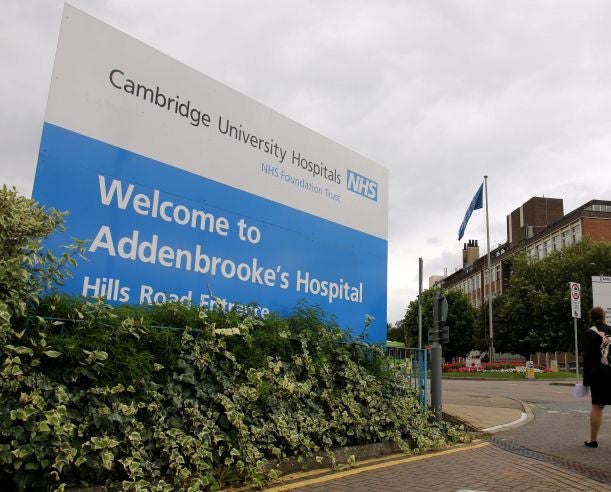Addenbrooke Q&A: What does it mean when a hospital goes into 'special measures'?
Cambridge University Hospitals Foundation Trust has been put in special measures after a damning report by the CQC

Your support helps us to tell the story
From reproductive rights to climate change to Big Tech, The Independent is on the ground when the story is developing. Whether it's investigating the financials of Elon Musk's pro-Trump PAC or producing our latest documentary, 'The A Word', which shines a light on the American women fighting for reproductive rights, we know how important it is to parse out the facts from the messaging.
At such a critical moment in US history, we need reporters on the ground. Your donation allows us to keep sending journalists to speak to both sides of the story.
The Independent is trusted by Americans across the entire political spectrum. And unlike many other quality news outlets, we choose not to lock Americans out of our reporting and analysis with paywalls. We believe quality journalism should be available to everyone, paid for by those who can afford it.
Your support makes all the difference.One of the biggest NHS trusts in the country has been placed in special measures after its hospitals were branded “inadequate” by the.
The NHS regulator Monitor has taken over Addenbrooke's Hospital in Cambridge after a CQC report said it was poorly led, unsafe and disorganised.
Although the report said staff “did everything they could for patients in their care”, patients would routinely have to wait more than 18 weeks for operations and a new IT system meant people were not always being prescribed the correct medicines.
The Cambridge University Hospitals Foundation Trust, which runs Addenbrooke's, is also due to report a £64m deficit this year, according to government health regulator Monitor.
The trust’s chief executive, Keith McNeil, stood down on 14th September saying the trust had faced “serious challenges”.
What is special measures?
Special measures is a term to describe when the CQC and either Monitor or the NHS Trust Development Authority (NHS TDA) intervene to help a hospital improve its services.
Typically the regulators and local health commissioners will help the trust write an “action plan” of steps taken to improve its services and an improvement director will be appointed to monitor the trust’s progress.
Monitor or the NHS TDA can also step in to review the trust’s senior management.
What is Monitor?
Monitor is a government agency set up in 2004 to monitor foundation trusts.
There are two types of hospital trust. Cambridge University Hospitals Trust is a foundation trust, which means it has greater freedoms than other trusts as it is not directly controlled by central government and can appoint its own board.
These trusts are regulated by Monitor. Regular trusts without these freedoms are regulated by the NHS TDA.
Who is in charge while a hospital is in special measures?
The hospital’s board of directors remain in charge and is responsible for carrying out the changes laid out in their action plan. But Monitor or the NHS TDA do have the power to change board members or bring in external experts if they believe it is necessary.
How long will special measures last?
Special measures lasts until the regulator is satisfied that the hospital has carried out the required improvements. At the end of the year, the CQC will carry out another inspection and if the hospital has substantially improved it will recommend to Monitor or the NHS TDA that it comes out of special measures.
Will the hospital close?
It is very unlikely. Special measures is designed to improve care, not close hospitals down. You can still use a hospital while it is in special measures and not all of it services may have been rated inadequate.
Source: NHS England
Join our commenting forum
Join thought-provoking conversations, follow other Independent readers and see their replies
Comments